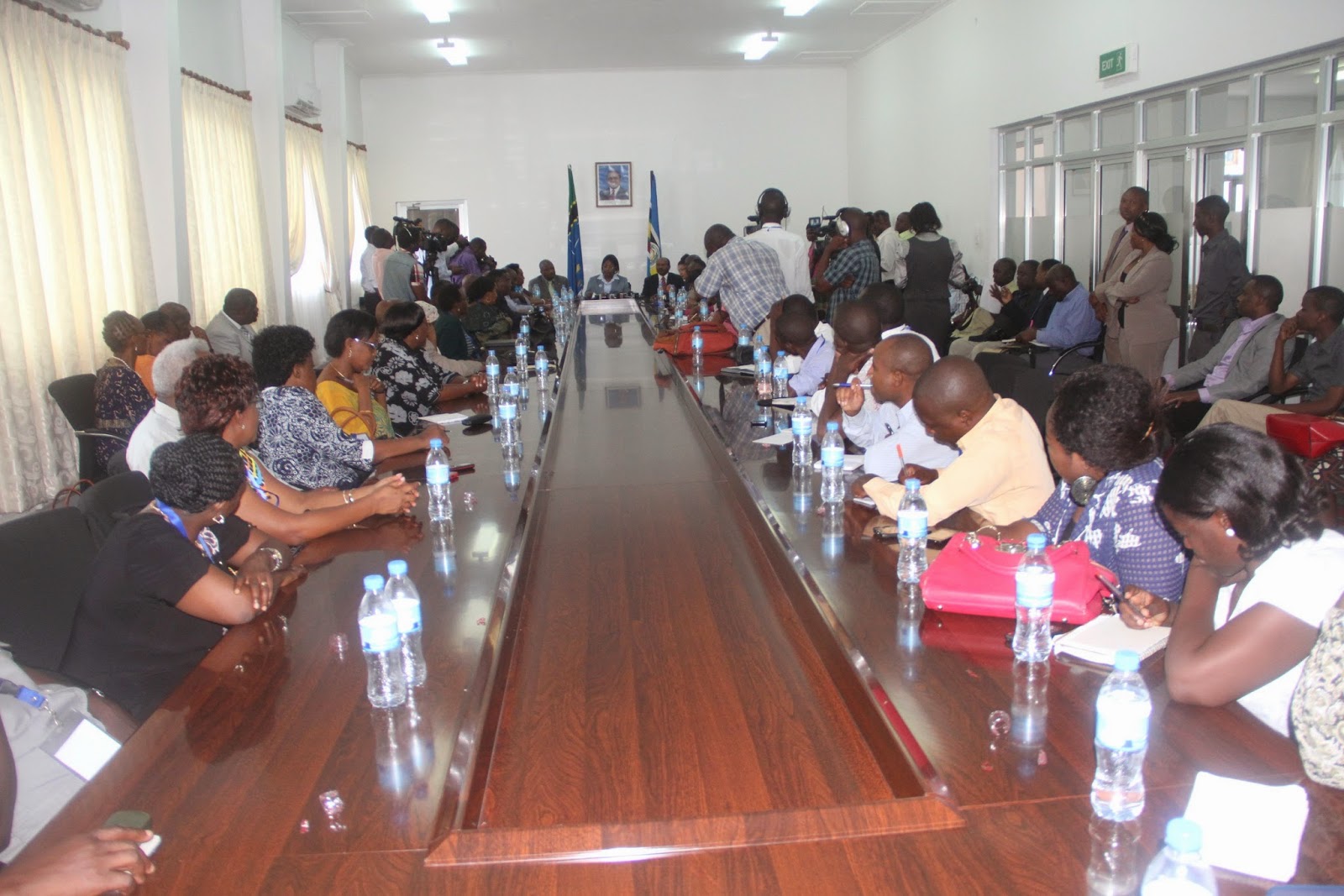The 1st Meeting of the 3rd
Session of the 3rd East African Legislative Assembly (EALA) is scheduled
to take place at the Karimjee Hall, in Dar es Salaam starting from 25th August 2014 to September 5th,
2014.
Addressing the members of media during the curtain raiser conference,
the EALA Speaker Hon. Dr. Margret Nantongo Zziwa saluted His Excellency, President
Dr Jakaya Mrisho Kikwete, and the entire Government of the United Republic of
Tanzania for accepting to host the EALA in Dar es Salaam. “We appreciate the
leadership of H.E. Dr Kikwete in steering the United Republic of Tanzania and
for his significant contribution to the EAC as a Member of the Summit” she
reiterated.
This is the first time that the 3rd Assembly is meeting in
Dar es Salaam as part of the pursuit of the principle of rotation anchored on
EALA’s Strategic objective of enhancing the visibility of the Assembly by
taking it nearer to the people. Meetings of the Assembly are now frequently
held in all the Partner States as per the Provisions of Article 55 of the
Treaty for the Establishment of the East African Community.
Dr. Zziwa went further to thank the Speaker of the Parliament of
Tanzania, Rt. Hon Anna Makinda for granting access to the facilities at the
Parliament of Tanzania and at the Karimjee Hall for the Session.
According to Madam Zziwa, the two-weeks the Assembly will conduct the
following notable business for consideration:
·
receive and
consider reports from various Committees of the Assembly. The Reports include that of the Committee on
Regional Affairs and Conflict Resolutions and the African Leadership Centre on
East African Societies and Regional Security; Report of the Committee on
Agriculture, Tourism and Natural Resources on Regional Parliamentarians’
Workshop on Forests and Climate Change and the Report of the Committee on
Communication, Trade and Investment on the EAC Aviation Sector.
Also there are a number of Bills that will be put before the House which are:
Also there are a number of Bills that will be put before the House which are:
a) the EAC Integration (Education) Bill – which the House
expects an update from the Committee on Regional Affairs and Conflict Resolution
as to how far it is with regards to inputs from Partner State Parliaments and
other stakeholders;
b) the EAC Co-operatives Societies Bill – this is before the
Committee on Agriculture, Tourism and Natural Resources and it will soon
conduct public hearings
c) the EAC Joint Trade Negotiations (Repeal) Bill – before the
Committee on Communication, Trade and Investments.
Finally, the House will consider Motions, Resolutions and Questions brought before the House.
The EAC is at an important period in the integration dispensation. “We appreciate the fact that all Partner
States are committed to strengthening the integration process and in so doing
are implementing the provisions of the various Protocols. The Customs Union
attained its full implementation and several phases are at an advanced stage.
Hereunder, goods produced in the region enjoy zero taxes but benefit from
uniform external benefits, procedures and documentation. The Single Customs Territory regime is a
further welcome to the EAC since it shall enable the faster movement of
goods. The aim of creating a Single Customs Territory is
to enable partner states to enjoy economies of scale, with a view to supporting
the process of economic development.
Here, the establishment of the One Stop Border Post principle which is
now fully operational, backed by the law (OSPB law) is a furtherance to the
Single Customs Territory and the movement of goods and people.” Speaker
Nantongo Zziwa told the media fraternity.
The fourth year of the implementation of
the Common Market has commenced. The Common Market Protocol provides for free
movement of goods, services, labour, capital and the rights to establishment
among others. Generally, Partner States
have shown their willingness to enforce the provisions of the said Protocols.
The EAC has also signed the Monetary Union, the important third step in the
four-tier integration process. We congratulate the United Republic of Tanzania for
it has already signed for the ratification of the Monetary Union Protocol
according to the timelines.
She further explained that the
implementation of the Monetary Union Protocol is expected to commence once all
the Partner States ratify and deposit the instruments with the Secretary
General of the EAC. This is a critical phase that will cement and solidify the
integration process. But real
implementation of these Protocols will require various pieces of legislation.
As EALA, we are prepared to enact these legislations and therefore call upon
the Council of Ministers to expeditiously bring these Bills to the House.
Despite the notable progress, there are
challenges. As previously stated, we need to ensure that Non-Tariff Barriers
are effectively addressed. A suitable
mechanism should be put in place and enforced and as EALA, we shall appeal to
the Summit to speed up the process.
The central corridor is a key
infrastructure that services the mainland of Tanzania, Rwanda and Burundi
hinterland. We welcome the improvements
made on this Central Corridor – including reducing the roadblocks and
standardizing the security checks. This
is in line with the commitments of the Summit especially after the
infrastructure Summit in Nairobi in 2012.
Responding to questions from media
community Hon. Nantongo Zziwa said that the challenges
include the slow-uptake of the agenda of the EAC in the national policy
networks. We shall continue collaborating with all the Council of Ministers and
other stakeholders and in carrying out of our mandate as stipulated by the
Treaty to ensure that our EAC economic bloc is strengthened. It is important to note that the laws enacted by the EAC have the full
force and take precedent over similar laws in the Partner States on matters
related to the Community. We thus appeal to all Partner States to speedily
harmonise their national laws with the Community law.






























